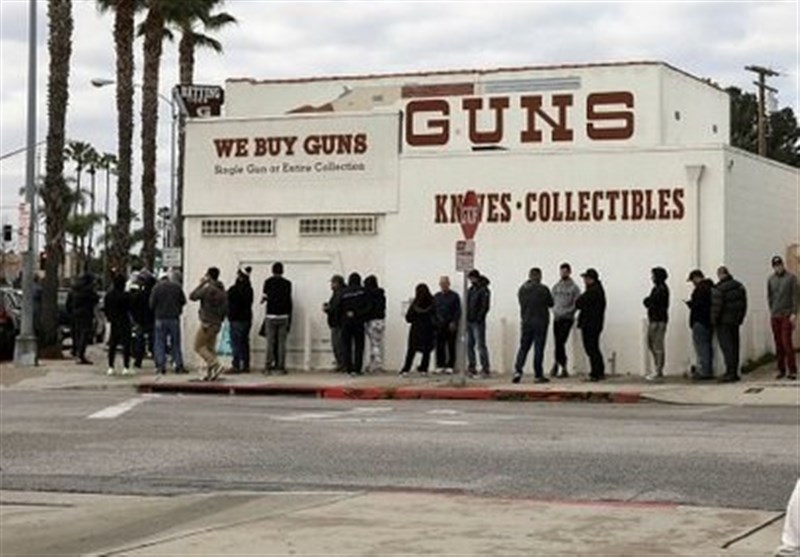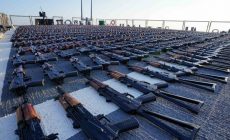US sales of guns and ammunition soar amid coronavirus panic buying
- Posted on
- Comment

Sales of guns and ammunition are soaring across the US as fears of possible social unrest amid the coronavirus crisis are prompting some Americans to turn to firearms as a form of self-protection.
On the west coast, long lines of customers were queueing up outside gun stores to stock up on deadly materials. At the Martin B Retting gun shop in Culver City, California, the queues stretched round the block throughout the weekend.
One customer told the LA Times: “Politicians and anti-gun people have been telling us for the longest time that we don’t need guns. But right now, a lot of people are truly scared, and they can make that decision themselves.”
Larry Hyatt, owner of one of the country’s largest gun shops, Hyatt Guns in Charlotte, North Carolina, told the Guardian that the scenes of mass buying at his store were virtually unprecedented. “This is only the second time in my 61 years of business that we’ve seen anything like this,” he said, adding that the first occasion was the aftermath of the mass shooting at Sandy Hook elementary school in Connecticut in 2012.
“We are experiencing a massive rush to buy guns and ammunition as people feel the need to protect themselves and their families.”
Hyatt said that the type of guns being bought was reflective of the fear prevalent among customers. There was almost no interest in hunting rifles. Instead, people were opting for target guns and there was big demand for AR-15 semi-automatic assault-style rifles.
Asked why he thought the spike was happening, Hyatt replied: “Financial meltdown, pandemic, crime, politics … you throw it all into the pot, and you have one hell of a mess.”
A major online dealer of ammunition, Ammo.com, has put out figures for sales from 23 February to 4 March that give an indication of the scale of the surge. In that 11-day period sales increased 68% compared to the 11 days up to 23 February.
Sales were especially pronounced in North Carolina and Georgia, which experienced a leap of 179% and 169% respectively. Other states with large increases included Pennsylvania, Texas, Florida, Illinois and New York.
In a statement, Ammo.com’s marketing manager, Alex Horsman, said: “We know certain things impact ammo sales, mostly political events or economic instability when people feel their rights may end up infringed. This is our first experience with a virus leading to such a boost in sales.”
Apart from general anxiety surrounding coronavirus, some gun sale spikes appeared to have specific causes. The Trace reported that in Washington state and California, locations of early outbreaks of the virus, gun sales increased acutely propelled by Asian Americans fearful that they could face xenophobic and racist violence against their families given that the original source of coronavirus was China.
“People are panicking because they don’t feel secure. They worry about a riot or maybe that people will start to target the Chinese,” David Liu, a Chinese-American gun dealer outside Los Angeles, told the Trace.
Amid the rush to stockpile lethal weapons, there were concerns for the safety of children. A sudden increase in guns and rifles in domestic homes could put children at risk through lack of safe storage.
Firearms are already the second most prevalent killer of children in the US after car crashes. In the 14- to 17-year-old bracket, gun injuries are the highest single cause of death, according to research from the University of Michigan school of public health.
Since you’re here…
… we’re asking readers like you to make a contribution in support of the Guardian’s open, independent journalism. At extraordinary times like these, anxiety and uncertainty abound. But we aim to provide reassurance with regularly-updated, properly-sourced, accurate information, to help you make decisions about your life, health and security. Misinformation and rumours abound, and they are spreading alarm. But our reporting teams around the world are committed to finding out the facts, calmly and rationally.
Because we believe Guardian journalism is an important source of clear and trusted information, we have always kept it open to everyone, regardless of where they live or what they can afford to pay. This would not be possible without the generosity of our growing band of supporters in more than 180 countries, who give so that everyone can read.
More people than ever are deciding that it’s only fair to underwrite regular usage of our site with a contribution. This enables us to maintain our independence from external pressures, meaning that we can set our own agenda and voice our own opinions. Guardian journalism is free from commercial and political bias – never influenced by billionaire owners or shareholders. This makes us different. It means we can challenge the powerful without fear and give a voice to those less heard.
We need your support so we can keep delivering quality journalism that’s open and independent… and that is here for the long term. Every reader contribution, however big or small, is so valuable.
-The Guardian










 (Selorm) |
(Selorm) |  (Nana Kwesi)
(Nana Kwesi)